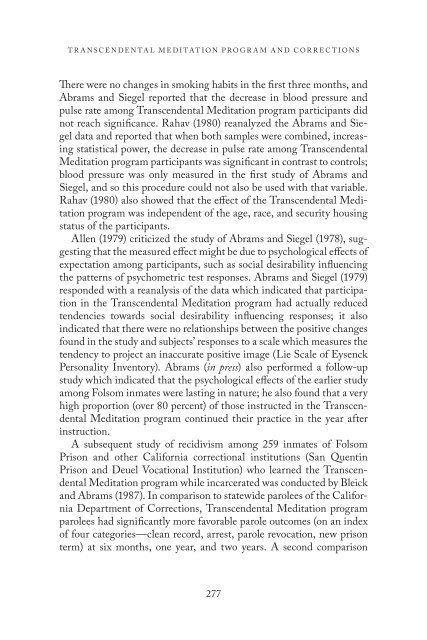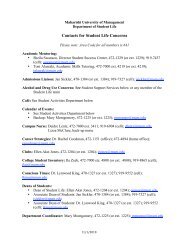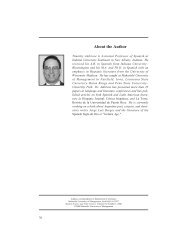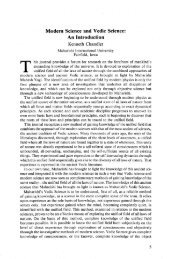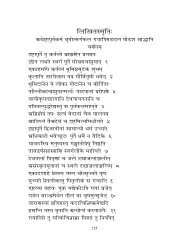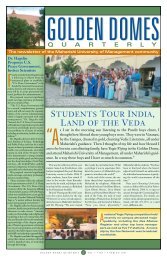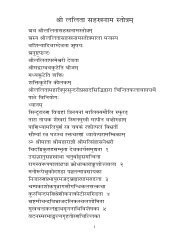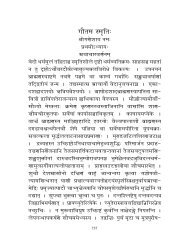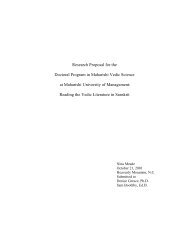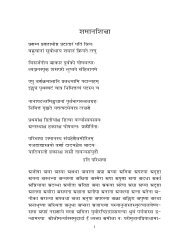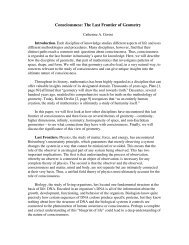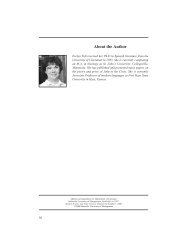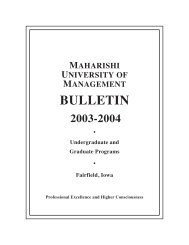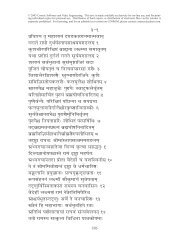- Page 4 and 5:
©2011 by Maharishi University of M
- Page 6 and 7:
Consciousness-based education and g
- Page 8 and 9:
CoNSCIoUSNESS-BASED EDUCATIoN AND G
- Page 10 and 11:
Consciousness-based education and g
- Page 12 and 13:
Consciousness-based education and g
- Page 14 and 15:
Consciousness-based education and g
- Page 16 and 17:
Consciousness-based education and g
- Page 18 and 19:
CoNSCIoUSNESS-BASED EDUCATIoN AND G
- Page 20 and 21:
Consciousness-based education and g
- Page 22 and 23:
Consciousness-based education and g
- Page 24 and 25:
consciousness-based education and g
- Page 26 and 27:
consciousness-based education and g
- Page 28:
Johnson, Paul Gelderloos, and Micha
- Page 33 and 34:
Success in Government■Ian Douglas
- Page 35 and 36:
success in governmentabstractThis p
- Page 37 and 38:
success in governmentprinciples of
- Page 39 and 40:
success in governmenttechnologies o
- Page 41 and 42:
success in governmentout of fashion
- Page 43 and 44:
success in governmentof religion or
- Page 45 and 46:
success in governmentuniversal fiel
- Page 52:
consciousness-based education and g
- Page 55 and 56:
success in governmentyoung children
- Page 57:
success in governmentMaharishi Mahe
- Page 60 and 61:
consciousness-based education and g
- Page 62:
consciousness-based education and g
- Page 66 and 67:
consciousness-based education and g
- Page 68 and 69:
consciousness-based education and g
- Page 70 and 71:
consciousness-based education and g
- Page 72 and 73:
consciousness-based education and g
- Page 74 and 75:
consciousness-based education and g
- Page 76 and 77:
consciousness-based education and g
- Page 78 and 79:
consciousness-based education and g
- Page 80 and 81:
consciousness-based education and g
- Page 82 and 83:
consciousness-based education and g
- Page 84 and 85:
consciousness-based education and g
- Page 86 and 87:
consciousness-based education and g
- Page 88 and 89:
consciousness-based education and G
- Page 90 and 91:
consciousness-based education and G
- Page 92 and 93:
consciousness-based education and G
- Page 94 and 95:
consciousness-based education and G
- Page 96 and 97:
consciousness-based education and G
- Page 98 and 99:
consciousness-based education and G
- Page 100 and 101:
consciousness-based education and G
- Page 102:
consciousness-based education and g
- Page 107 and 108:
Absolute Principles of Societyin Ma
- Page 109 and 110:
absolute principles of societyAbstr
- Page 111 and 112:
absolute principles of societytrans
- Page 113 and 114:
absolute principles of societynew e
- Page 115 and 116:
absolute principles of societyfield
- Page 117 and 118:
absolute principles of societynorma
- Page 119 and 120:
absolute principles of societyhave
- Page 121 and 122:
absolute principles of societythe b
- Page 123 and 124:
absolute principles of societyMahar
- Page 125 and 126:
absolute principles of societyMahar
- Page 127 and 128:
absolute principles of societyenon
- Page 129 and 130:
absolute principles of societysœ;"
- Page 131 and 132:
absolute principles of societyMahar
- Page 133 and 134:
absolute principles of societyMahar
- Page 135 and 136:
absolute principles of societysuffe
- Page 137 and 138:
absolute principles of societycalam
- Page 139 and 140:
absolute principles of societyabout
- Page 141 and 142:
absolute principles of societyThe i
- Page 143 and 144:
absolute principles of societypract
- Page 145 and 146:
absolute principles of societyto th
- Page 147:
absolute principles of societyG. Cl
- Page 150 and 151:
CONSCIOUSNESS-BASED EDUCATION AND G
- Page 152 and 153:
CONSCIOUSNESS-BASED EDUCATION AND G
- Page 154 and 155:
CONSCIOUSNESS-BASED EDUCATION AND G
- Page 156 and 157:
CONSCIOUSNESS-BASED EDUCATION AND G
- Page 158 and 159:
CONSCIOUSNESS-BASED EDUCATION AND G
- Page 160 and 161:
CONSCIOUSNESS-BASED EDUCATION AND G
- Page 162 and 163:
CONSCIOUSNESS-BASED EDUCATION AND G
- Page 164 and 165:
CONSCIOUSNESS-BASED EDUCATION AND G
- Page 166 and 167:
CONSCIOUSNESS-BASED EDUCATION AND G
- Page 168 and 169:
CONSCIOUSNESS-BASED EDUCATION AND G
- Page 170 and 171:
CONSCIOUSNESS-BASED EDUCATION AND G
- Page 172 and 173:
CONSCIOUSNESS-BASED EDUCATION AND G
- Page 174 and 175:
CONSCIOUSNESS-BASED EDUCATION AND G
- Page 176 and 177:
CONSCIOUSNESS-BASED EDUCATION AND G
- Page 178 and 179:
CONSCIOUSNESS-BASED EDUCATION AND G
- Page 180 and 181:
CONSCIOUSNESS-BASED EDUCATION AND G
- Page 182 and 183:
CONSCIOUSNESS-BASED EDUCATION AND G
- Page 184 and 185:
CONSCIOUSNESS-BASED EDUCATION AND G
- Page 186:
CONSCIOUSNESS-BASED EDUCATION AND G
- Page 191 and 192:
Harnessing the Laws of Natureto Bri
- Page 193 and 194:
Harnessing the laws of nature—max
- Page 195 and 196:
Harnessing the laws of nature—max
- Page 197 and 198:
Harnessing the laws of nature—max
- Page 199 and 200:
Harnessing the laws of nature—max
- Page 201 and 202:
Harnessing the laws of nature—max
- Page 203 and 204:
Harnessing the laws of nature—max
- Page 205 and 206:
Harnessing the laws of nature—max
- Page 207 and 208:
Harnessing the laws of nature—max
- Page 209 and 210:
Harnessing the laws of nature—max
- Page 211 and 212:
Harnessing the laws of nature—max
- Page 213 and 214:
Harnessing the laws of nature—max
- Page 215 and 216:
Harnessing the laws of nature—max
- Page 217 and 218:
Harnessing the laws of nature—max
- Page 219 and 220:
Harnessing the laws of nature—max
- Page 221 and 222:
Harnessing the laws of nature—max
- Page 223 and 224:
Harnessing the laws of nature—max
- Page 225 and 226:
Harnessing the laws of nature—max
- Page 227 and 228:
Harnessing the laws of nature—max
- Page 229 and 230:
Harnessing the laws of nature—max
- Page 231 and 232:
Harnessing the laws of nature—max
- Page 233: Harnessing the laws of nature—max
- Page 236 and 237: consciousness-based education and g
- Page 238 and 239: consciousness-based education and g
- Page 240 and 241: consciousness-based education and g
- Page 242 and 243: consciousness-based education and g
- Page 244 and 245: consciousness-based education and g
- Page 246 and 247: consciousness-based education and g
- Page 248 and 249: consciousness-based education and g
- Page 250 and 251: consciousness-based education and g
- Page 252 and 253: consciousness-based education and g
- Page 254 and 255: consciousness-based education and g
- Page 256 and 257: consciousness-based education and g
- Page 258 and 259: consciousness-based education and g
- Page 260 and 261: consciousness-based education and g
- Page 262 and 263: consciousness-based education and g
- Page 264 and 265: consciousness-based education and g
- Page 266 and 267: consciousness-based education and g
- Page 268 and 269: consciousness-based education and g
- Page 270 and 271: consciousness-based education and g
- Page 273 and 274: The Application ofThe Transcendenta
- Page 275 and 276: TRANSCEnDENTAL MEDITATION PROGRAM a
- Page 277 and 278: TRANSCEnDENTAL MEDITATION PROGRAM a
- Page 279 and 280: TRANSCEnDENTAL MEDITATION PROGRAM a
- Page 281 and 282: TRANSCEnDENTAL MEDITATION PROGRAM a
- Page 283: TRANSCEnDENTAL MEDITATION PROGRAM a
- Page 287 and 288: TRANSCEnDENTAL MEDITATION PROGRAM a
- Page 289 and 290: TRANSCEnDENTAL MEDITATION PROGRAM a
- Page 291 and 292: TRANSCEnDENTAL MEDITATION PROGRAM a
- Page 293 and 294: TRANSCEnDENTAL MEDITATION PROGRAM a
- Page 295 and 296: TRANSCEnDENTAL MEDITATION PROGRAM a
- Page 297 and 298: TRANSCEnDENTAL MEDITATION PROGRAM a
- Page 299 and 300: TRANSCEnDENTAL MEDITATION PROGRAM a
- Page 301 and 302: TRANSCEnDENTAL MEDITATION PROGRAM a
- Page 303 and 304: Improving the Effectiveness of Scho
- Page 305 and 306: improving the effectiveness of scho
- Page 307 and 308: improving the effectiveness of scho
- Page 309 and 310: improving the effectiveness of scho
- Page 311 and 312: improving the effectiveness of scho
- Page 313 and 314: improving the effectiveness of scho
- Page 315 and 316: improving the effectiveness of scho
- Page 317 and 318: improving the effectiveness of scho
- Page 319 and 320: improving the effectiveness of scho
- Page 321 and 322: improving the effectiveness of scho
- Page 323 and 324: improving the effectiveness of scho
- Page 325 and 326: improving the effectiveness of scho
- Page 327 and 328: improving the effectiveness of scho
- Page 329 and 330: Medical Care Utilization and theTra
- Page 331 and 332: medical care utilization and transc
- Page 333 and 334: medical care utilization and transc
- Page 335 and 336:
medical care utilization and transc
- Page 337 and 338:
medical care utilization and transc
- Page 339 and 340:
medical care utilization and transc
- Page 341 and 342:
medical care utilization and transc
- Page 343 and 344:
medical care utilization and transc
- Page 345 and 346:
medical care utilization and transc
- Page 347 and 348:
medical care utilization and transc
- Page 349 and 350:
medical care utilization and transc
- Page 351 and 352:
medical care utilization and transc
- Page 353 and 354:
medical care utilization and transc
- Page 355 and 356:
The Health Care Cost Crisis and the
- Page 357 and 358:
Health Care Cost Crisis and transce
- Page 359 and 360:
Health Care Cost Crisis and transce
- Page 361 and 362:
Health Care Cost Crisis and transce
- Page 363 and 364:
Health Care Cost Crisis and transce
- Page 365 and 366:
Health Care Cost Crisis and transce
- Page 367 and 368:
Health Care Cost Crisis and transce
- Page 369 and 370:
Health Care Cost Crisis and transce
- Page 371 and 372:
Health Care Cost Crisis and transce
- Page 373 and 374:
Health Care Cost Crisis and transce
- Page 375 and 376:
Health Care Cost Crisis and transce
- Page 377 and 378:
Health Care Cost Crisis and transce
- Page 379 and 380:
Health Care Cost Crisis and transce
- Page 381 and 382:
Health Care Cost Crisis and transce
- Page 383 and 384:
Health Care Cost Crisis and transce
- Page 385 and 386:
Health Care Cost Crisis and transce
- Page 387 and 388:
Health Care Cost Crisis and transce
- Page 389 and 390:
Health Care Cost Crisis and transce
- Page 391 and 392:
Health Care Cost Crisis and transce
- Page 393 and 394:
Health Care Cost Crisis and transce
- Page 395 and 396:
Improving the National EconomyThrou
- Page 397 and 398:
improving national economy—allian
- Page 399 and 400:
improving national economy—allian
- Page 401 and 402:
improving national economy—allian
- Page 403 and 404:
improving national economy—allian
- Page 405 and 406:
improving national economy—allian
- Page 407 and 408:
improving national economy—allian
- Page 409 and 410:
improving national economy—allian
- Page 411 and 412:
improving national economy—allian
- Page 413 and 414:
improving national economy—allian
- Page 415 and 416:
improving national economy—allian
- Page 417 and 418:
improving national economy—allian
- Page 419 and 420:
improving national economy—allian
- Page 421 and 422:
improving national economy—allian
- Page 423 and 424:
improving national economy—allian
- Page 425 and 426:
improving national economy—allian
- Page 427 and 428:
improving national economy—allian
- Page 429 and 430:
improving national economy—allian
- Page 431 and 432:
improving national economy—allian
- Page 433 and 434:
improving national economy—allian
- Page 435 and 436:
improving national economy—allian
- Page 437 and 438:
improving national economy—allian
- Page 439 and 440:
improving national economy—allian
- Page 441 and 442:
improving national economy—allian
- Page 443 and 444:
improving national economy—allian
- Page 445 and 446:
improving national economy—allian
- Page 447 and 448:
improving national economy—allian
- Page 449 and 450:
improving national economy—allian
- Page 451 and 452:
improving national economy—allian
- Page 453:
improving national economy—allian
- Page 456 and 457:
consciousness-based education and g
- Page 458 and 459:
consciousness-based education and g
- Page 460 and 461:
consciousness-based education and g
- Page 463 and 464:
U.S.-Soviet Relations and the Mahar
- Page 465 and 466:
AbstractThis paper empirically test
- Page 467 and 468:
U.S.-Soviet Relations and the Mahar
- Page 469 and 470:
U.S.-Soviet Relations and the Mahar
- Page 471 and 472:
U.S.-Soviet Relations and the Mahar
- Page 473 and 474:
U.S.-Soviet Relations and the Mahar
- Page 475 and 476:
U.S.-Soviet Relations and the Mahar
- Page 477 and 478:
U.S.-Soviet Relations and the Mahar
- Page 479 and 480:
U.S.-Soviet Relations and the Mahar
- Page 481 and 482:
U.S.-Soviet Relations and the Mahar
- Page 483 and 484:
U.S.-Soviet Relations and the Mahar
- Page 485 and 486:
U.S.-Soviet Relations and the Mahar
- Page 487 and 488:
U.S.-Soviet Relations and the Mahar
- Page 489 and 490:
U.S.-Soviet Relations and the Mahar
- Page 491 and 492:
U.S.-Soviet Relations and the Mahar
- Page 493 and 494:
U.S.-Soviet Relations and the Mahar
- Page 495 and 496:
U.S.-Soviet Relations and the Mahar
- Page 497 and 498:
U.S.-Soviet Relations and the Mahar
- Page 499 and 500:
U.S.-Soviet Relations and the Mahar
- Page 501 and 502:
U.S.-Soviet Relations and the Mahar
- Page 503:
ENHANCED EEG ALPHA TIME-DOMAIN PHAS
- Page 506 and 507:
consciousness-based education and g
- Page 508 and 509:
consciousness-based education and g
- Page 510 and 511:
consciousness-based education and g
- Page 512 and 513:
consciousness-based education and g
- Page 514 and 515:
consciousness-based education and g
- Page 516 and 517:
consciousness-based education and g
- Page 518 and 519:
consciousness-based education and g
- Page 520 and 521:
consciousness-based education and g
- Page 522 and 523:
consciousness-based education and g
- Page 524 and 525:
consciousness-based education and g
- Page 526 and 527:
consciousness-based education and g
- Page 528 and 529:
consciousness-based education and g
- Page 530 and 531:
consciousness-based education and g
- Page 532 and 533:
consciousness-based education and g
- Page 534 and 535:
consciousness-based education and g
- Page 536 and 537:
consciousness-based education and g
- Page 538 and 539:
International Journal of Neuroscien
- Page 541 and 542:
The Effects of theMaharishi Technol
- Page 543 and 544:
quality of life in the us (1960-198
- Page 545 and 546:
quality of life in the us (1960-198
- Page 547 and 548:
quality of life in the us (1960-198
- Page 549 and 550:
quality of life in the us (1960-198
- Page 551 and 552:
quality of life in the us (1960-198
- Page 553 and 554:
quality of life in the us (1960-198
- Page 555 and 556:
quality of life in the us (1960-198
- Page 557 and 558:
quality of life in the us (1960-198
- Page 559 and 560:
quality of life in the us (1960-198
- Page 561 and 562:
quality of life in the us (1960-198
- Page 563 and 564:
quality of life in the us (1960-198
- Page 565 and 566:
quality of life in the us (1960-198
- Page 567 and 568:
quality of life in the us (1960-198
- Page 569 and 570:
quality of life in the us (1960-198
- Page 571 and 572:
quality of life in the us (1960-198
- Page 573:
quality of life in the us (1960-198
- Page 577 and 578:
Modern Science and Vedic Science:An
- Page 579 and 580:
Modern science and vedic science: a
- Page 581 and 582:
Modern science and vedic science: a
- Page 583 and 584:
Modern science and vedic science: a
- Page 585 and 586:
Modern science and vedic science: a
- Page 587 and 588:
Modern science and vedic science: a
- Page 589 and 590:
Modern science and vedic science: a
- Page 591 and 592:
Modern science and vedic science: a
- Page 593 and 594:
Modern science and vedic science: a
- Page 595 and 596:
Modern science and vedic science: a
- Page 597 and 598:
Modern science and vedic science: a
- Page 599 and 600:
Modern science and vedic science: a
- Page 601 and 602:
Modern science and vedic science: a
- Page 603 and 604:
Modern science and vedic science: a
- Page 605 and 606:
Modern science and vedic science: a
- Page 607 and 608:
Modern science and vedic science: a
- Page 609 and 610:
Modern science and vedic science: a
- Page 611 and 612:
Modern science and vedic science: a
- Page 613 and 614:
ResourcesLinksElectronic Resources


